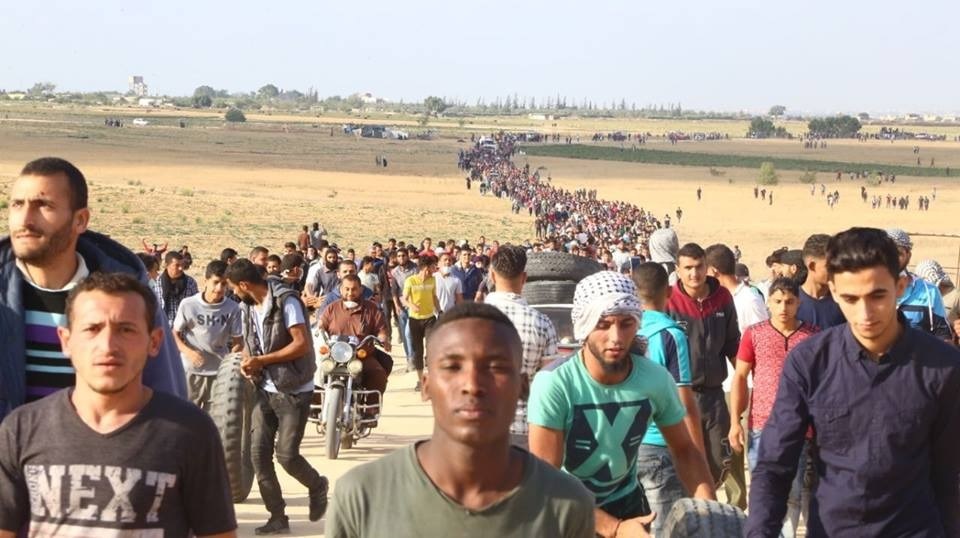
As the U.S. and Israel celebrated the move of the U.S. Embassy from Tel Aviv to Jerusalem on May 14, Palestinians in Gaza and the West Bank continued to protest the systematic denial of their rights. As U.S. officials spoke in Jerusalem about how their actions will bring peace, Palestinians were being killed in Gaza.
Tens of thousands of Palestinians have taken part in a sustained protest known as the Great Return March since March 30. The march was organized by Palestinians in Gaza as a nonviolent way to lift up before the world the ongoing denial of their rights living under occupation and siege. Israel has responded to these nonviolent protests through a brutal show of force. Israeli snipers opened fire against the protesters and deployed tear gas by drones, killing at least 105 Palestinians and injuring more than 10,000.
Tell Congress: Hold Israel accountable for killing Palestinian protesters.
The date of May 15, which culminated six weeks since the start of the march, holds special significance for Palestinians. It marked 70 years since the U.N. Partition Plan for Palestine went into effect and created the new state of Israel. While Israel celebrates this anniversary, Palestinians mourn what they term the “Nakba” or catastrophe, when more than 750,000 Palestinians were driven from their homes and over 500 Palestinian villages were destroyed.
As we continue to work to end the Israeli occupation, we must also reflect on the history of injustice that have denied Palestinians their freedom and rights for far too long. Here’s some historical perspective.
70 years since the Nakba
The impacts of the Nakba reverberate to this day. The mass displacement and dispossession led to a complete rupture in Palestinian social, cultural, economic, and political life.
AFSC began working in Israel and Palestine in 1948, setting up the refugee camp system for Palestinians in Gaza and providing assistance to people displaced inside the new Israeli state. In 1950, as AFSC prepared to turn over responsibility for the refugee camp system to the newly formed U.N. Relief and Works Agency, AFSC was asked to extend its service in Gaza. AFSC refused, telling the U.N. that the international community’s unwillingness to address Palestinian refugees’ right of return and the political rights of refugees would result in a long-term political morass and sustained conflict. Those fears have been borne out over the proceeding decades.
None of those displaced were ever allowed to return to their communities, and the Palestinian refugee population has continued to grow. Today, there are more than 7 million Palestinian refugees scattered around the world.
50 years of occupation
This year marks 50 years of the Israeli occupation. For half a century, Palestinians in the West Bank and Gaza have lived under a brutal military regime that systematically denies them their most basic rights. Israel restricts Palestinian movement, denies them access to holy sites, demolishes their homes, limits their water and electricity, and deprives them of self-determination.
Israel continues to expand its settlements—considered illegal under international law—taking private Palestinian land without compensation and further fragmenting Palestinian geography. Israel also maintains segregated road systems, separate legal systems, and other discriminatory institutions that force Palestinians to live as second-class non-citizens.
Displacement and fragmentation define everyday life for Palestinians. Tens of Palestinian villages in the West Bank and thousands of Palestinian homes in Jerusalem are under demolition order. Since 1967, approximately 15,000 Palestinian residents of Jerusalem have had their right to residency in the city revoked, and many more Palestinians from the West Bank have had their residency rights permanently stripped away, forcing them to live in exile. In the West Bank, checkpoints divide one city from another and movement between the West Bank, Jerusalem, and Gaza is ruled by a byzantine system of military permits that forbid free movement to all Palestinians.
25 years since the Oslo Accords
This year marks 25 years since Yasir Arafat, chairman of the Palestinian Liberation Organization, and Yitzhak Rabin, prime minister of Israel, shook hands on the White House lawn to mark the official start of the Oslo Peace process. Since then, the number of settlers in the West Bank has nearly quadrupled from 115,000 settlers in 1993 to 435,000 settlers in 2017. An additional 350,000 Israeli settlers now live in East Jerusalem communities. Today, there are 127 recognized settlements and over 100 additional settlement outposts in the West Bank.
While the Oslo Accords resulted in limited Palestinian self-rule within Gaza and parts of the West Bank, the divisions that were created have effectively fragmented Palestinian geographic realities and separated communities and families. And despite the limited autonomy exercised by the Palestinian Authority, Israel continues to control all aspects of Palestinian life.
The five-year interim peace process was supposed to lead to a final agreement and Palestinian independence. Instead, 25 years have gone by without any prospect for peace on the horizon. Palestinians now live in what amounts to an apartheid reality within “bantustanized” geography.
How much longer?
It’s been 70 years since hundreds of thousands of Palestinians were driven from their homes in the Nakba. Year after year, Palestinians and their descendants continue to have their most basic rights denied. This institutionalized inequality and injustice, maintained through military violence, guarantees sustained conflict and violence that impact both Palestinians and Israelis. And it must end.
But to bring change, it is necessary to move beyond the failures of the peace process that has guided international policy for the last 25 years. We must also move beyond the limited attempts to build peace based on merely ending the occupation through completion of the partition process begun in 1948. Peace won’t be won by simply separating populations without addressing the deep injustices that have occurred over the past 70 years.
To move forward, we must be honest and willing to look back in ways that acknowledge and address the injustices that took place in 1948 when Palestinians were displaced as a result of the creation of Israel. In 1949, AFSC staff recognize that peace would not come without a just solution for refugees, including their right return home—and that recognition must finally guide political action and decisions.
After 70 years, we must finally recognize that pursuing partition with the goal of building nation states designed to serve ethno-nationalist ends and the privileging of one people’s rights over another’s will not solve conflict. A two-state solution may still remain an option on the table, but as we look to the future in Israel and Palestine we should not be afraid of thinking outside of the limits of that paradigm which is what has guided peace efforts to this point.
To bring peace, we must open ourselves to a radically transformed future, a future in which there is freedom, justice, and equality for all.
More resources:
Take action to hold Israel accountable for killing Palestinian protesters.
Learn more about AFSC's work for a just and lasting peace in Palestine in Israel.
Visit our Gaza Unlocked website to hear from Palestinians in Gaza and learn more about the blockade.
